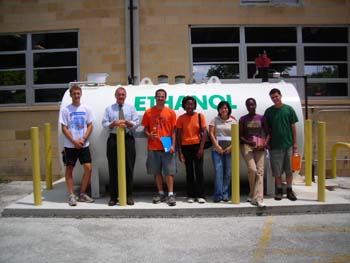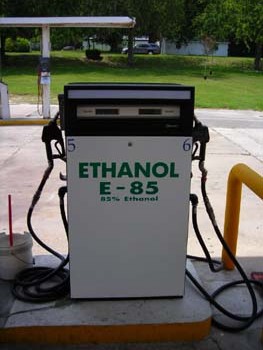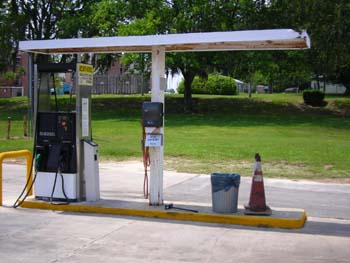UF's Vehicle Fleet

By: Gabe Espinosa
On Friday July 13,the interns took a field trip to the UF motor pool to speak with John Priest, the Auto/Maintenance Superintendent. We discussed with Mr.Priest the biofuels that the University is using, what the facility does with the vehicle fleet, and the prospects for alternative fuels in the future. We learned a good deal about biofuel use in real world applications.
 The Motor Pool has a low profile on campus but plays an important role to the vehicle fleet. The Motor Pool provides services to UF vehicles at a lower price ($46/hr labor rate) then other repair shops around town($85-120/hr). They strive for reliability in the fleet and push for newer vehicles to minimize the necessary repairs.
The Motor Pool has a low profile on campus but plays an important role to the vehicle fleet. The Motor Pool provides services to UF vehicles at a lower price ($46/hr labor rate) then other repair shops around town($85-120/hr). They strive for reliability in the fleet and push for newer vehicles to minimize the necessary repairs.
 First, some fast facts on the facility. The fuel tank sizes are 2000 gallons of E85, 12,000 gallons of gasoline, and 12,000 gallons of diesel; but all tanks are only filled to 90% of their capacity to allow for expansion. There are about 65 flex-fuel vehicles that use the E85 (85% ethanol and 15% gasoline), about 12 Hybrid Electric Vehicles (HEV’s), and all the diesel that the motor pool carries is B20, a mixture of diesel that contains 20% biodiesel. Both the B20 and the E85 is purchased from Lewis Oil, and Lewis Oil obtains their ethanol from Lakeland(I can’t believe it’s not butter/gasoline!) and their biodiesel from Doug Rink, who makes it from food court waste oil.
First, some fast facts on the facility. The fuel tank sizes are 2000 gallons of E85, 12,000 gallons of gasoline, and 12,000 gallons of diesel; but all tanks are only filled to 90% of their capacity to allow for expansion. There are about 65 flex-fuel vehicles that use the E85 (85% ethanol and 15% gasoline), about 12 Hybrid Electric Vehicles (HEV’s), and all the diesel that the motor pool carries is B20, a mixture of diesel that contains 20% biodiesel. Both the B20 and the E85 is purchased from Lewis Oil, and Lewis Oil obtains their ethanol from Lakeland(I can’t believe it’s not butter/gasoline!) and their biodiesel from Doug Rink, who makes it from food court waste oil.
 The flex-fuel vehicles are vehicles that can run on up to about 85% ethanol fuel in their gasoline. The cars are said to have a decrease in fuel economy of 12% while running on E85 compared to gasoline, but Mr.Priest did not have the numbers immediately available for comparison. Ethanol already has oxygen in its structure, so more of it must be burned in air to allow the car to run smoothly. Ethanol is conductive and can react unfavorably with parts of the fuel system if a car was not designed to run on ethanol. Most modern cars can safely run on a mixture of up to 10% ethanol. Since not all vehicles are designed to run on a mixture as high as E85, Mr.Priest has a fuel tester that uses the conductivity of the fuel to determine the ethanol concentration. Using the tester, we found the concentration of ethanol in a sample of the E85 to be 88% ethanol.
The flex-fuel vehicles are vehicles that can run on up to about 85% ethanol fuel in their gasoline. The cars are said to have a decrease in fuel economy of 12% while running on E85 compared to gasoline, but Mr.Priest did not have the numbers immediately available for comparison. Ethanol already has oxygen in its structure, so more of it must be burned in air to allow the car to run smoothly. Ethanol is conductive and can react unfavorably with parts of the fuel system if a car was not designed to run on ethanol. Most modern cars can safely run on a mixture of up to 10% ethanol. Since not all vehicles are designed to run on a mixture as high as E85, Mr.Priest has a fuel tester that uses the conductivity of the fuel to determine the ethanol concentration. Using the tester, we found the concentration of ethanol in a sample of the E85 to be 88% ethanol.
As previously stated, all of the diesel fuel sold at the Motor Pool is B20, a blend of 20% biodiesel and 80% petrodiesel. The biodiesel was tested by running a pair of grounds vehicles on B100 (100% biodiesel) for a number of miles and evaluating their performance and problems. The fuel filters were changed before the switch to biodiesel and at the conclusion of the test and no sediment was found on them. Diesel engines work slightly differently then most car engines: instead of using a spark to ignite the fuel, diesel engines use the higher pressure generated in their cylinders to auto-ignite the fuel once it is injected. Because diesel engines have higher compression ratios, sometimes as high as 22:1, they are designed to withstand these higher pressures and can continue to function well after the 100,000 mile mark. Biodiesel may help this already impressive longevity by having better lubricating properties then conventional diesel.
The push for a sustainable campus by President Machen ensures that new vehicles must run on alternative fuel, this means hybrids, flex-fuel, and biodiesel fleet vehicles are here to stay at UF.